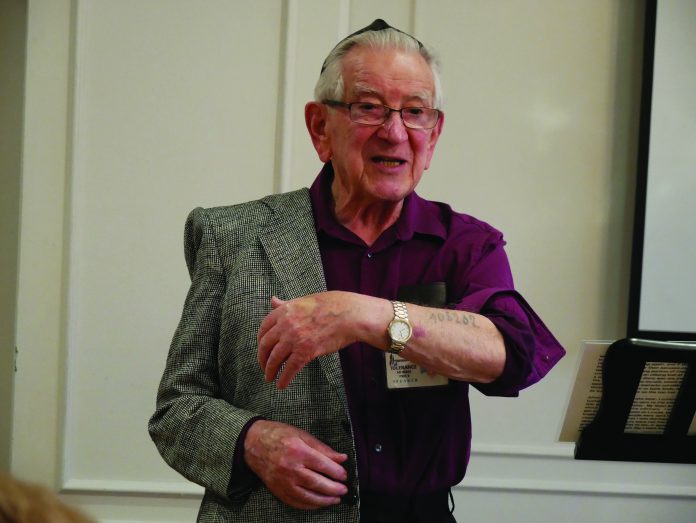By Christian May-Suzuki
When you hear certain stories, there is just this unshakable feeling that through some amazing stroke of luck, or a guardian angel of sorts has helped keep them alive. While burning and strong, the human spirit isn’t unbreakable, so it seems like something else gives them a hand.
Morris Price has one of the greatest wills that you will ever see, but even he admits that he feels a guardian angel watching him.
Born on April 27, 1927, as Moniek Prajs, he was 12 years old when the German army marched into his home country of Poland during World War II. He was the youngest of six children born to Manuela and Itka Prajs and lived with his parents, three sisters, and two brothers in his home city of Wolbrom. While he lived a relatively normal life with his family before that, the anti-Jewish laws that Germany enforced sent Price’s family into a constant state of fear.
“My father was doing business with farmers, and had a horse and wagon for transportation,” Price remembers. “In order to survive, my being the youngest was the one to be the driver, as the Germans would not pay much attention to a young boy.”
His family was moved to a labor camp, and Price was no longer allowed to attend public school or participate in extracurricular activities like sports and theater with other Poles.
In the summer of 1942, Price’s whole camp was called out to a field to be resettled, and his family was separated. Two of his sisters went into hiding with a farmer in Wolbrom, who was a friend of their father’s, while the father himself was sent to a labor camp. Unfortunately, not everyone in his family was given a fighting chance.
“My grandmother, mother, and older sister were sent to an extermination camp…exterminated,” Price solemnly recalls, his voice still coarse with the grief still living in his heart.
Price, who now just 15, was sent to another labor camp just outside Krakow, Poland with his two brothers. While they weren’t directly sent to be killed, the Germans who watched them didn’t treat them any less cruel.
“When we arrived [to the camp], we were ordered to line up,” Morris explained. “Evidently, we did not line up fast enough, so they shot someone in our group.”
Price’s work at the labor camp was mainly the construction of railroad tracks, but he also was sent on other various odd jobs for farmers and other workers.
While in the camp, Price overheard talk about a “final liquidation” in his hometown of Wolbrom. Price’s sisters, who had been in hiding, had returned to their house and were now in danger. Price and his brothers escaped with the help of a Polish man who the young boys made a deal with.
“I promised if he would buy two railroad tickets and pretend he was my dad, he could have whatever he wanted when we got to my home.” Price told us.
He was able to make it home and convince his sisters to leave Wolbrom and return to the house of the farm that had helped the sisters before. Of course, they had to sneak out.
“It was so dark, we could not see each other. We basically had to hold hands, but we made it there,” Price said.
However, after about 10 days, the farmer kicked them out, so Price and his sisters headed towards the Krakow ghetto.
“The farmer said his son would walk in front of us and lead us to Krakow,” Price recalled.
“But after 30 minutes, he disappeared.”
Price didn’t give up hope. They eventually found a Polish family that allowed them to stay overnight, and they were able to eventually sneak into the Krakow ghetto.
However, in March of 1943, Price was discovered and sent to Auschwitz. When he arrived at the camp, they began splitting the prisoners between those who could and couldn’t work.
Price, noticing he was on a train with the old, young, and sick, says he felt that guardian angel’s touch pushing him into the other train. When the opportunity presented itself, Price jumped out of the truck he was in and into the other group. The prisoners in the trucks were later gassed.
At the camp, Price talks about one thing: survival. He remembers that he would get extra soup because he made friends with someone in the kitchen, and how he salvaged extra bread. Through the strength of the human spirit, Price survived for 18 months until the prisoners of Auschwitz were forced to march away from the camp in the infamous Dachau Death March. During that time, Price recalls another event where he feels his guardian angel saved him.
“In one of the crematoriums, the prisoners revolted, and they were running out and running away,” Price explains. “I happened to be working on a detail and standing on that spot where they were running out in the most common pass way. The SS were shooting (the runaways), but when they got to me and saw I was wearing a different outfit, they stop.”
“I don’t know why they stopped.”
In the Dacau Death March, Price marched in the perilous conditions for around a week until he eventually liberated on May 1, 1945, by the United States Army. The first thing he did? Shower and find clean clothes to put on.
After being saved by the US, Price eventually moved there and settled in Culver City, where he worked for over 20 years and currently lives with his wife. He speaks because he feels the message, he has brought with him through his long journey of survival is one that should be passed down to the future.
“To kids who think they can’t do something, or they can’t make it, just stop,” Price says. “See if you can do something, and try to do it.
“If you tell yourself ‘I will make it,’ you will.”

